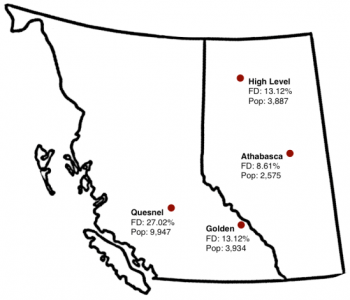Values and perceptions influence our decisions and the kinds of policy and actions we support. The success or failure of policy is in turn tied to its support from the general public and leading public figures. As the ultimate goal of AdapTree is policy recommendations, we set out to study perceptions of the use of assisted migration and genomics within forestry. We hosted focus groups in forestry dependent towns in British Columbia and Alberta to see how people felt about different methods of forest management.
 By running a series of focus groups we could note the reasoning behind people’s decisions to support or reject management techniques. The results of these discussions together with information gathered from a survey addressing similar questions will give the AdapTree team a better view of how people in forestry dependent communities might react to our policy recommendations.
By running a series of focus groups we could note the reasoning behind people’s decisions to support or reject management techniques. The results of these discussions together with information gathered from a survey addressing similar questions will give the AdapTree team a better view of how people in forestry dependent communities might react to our policy recommendations.
We conducted focus groups in four communities: Golden and Quesnel, BC and High Level and Athabasca, AB. One community with a forestry driven economy and one community with a more diverse economy was chosen from each province. Three groups were conducted in each community and each session consisted of members from a single social group. The three social groups represented were professional foresters, environmentalists and business owners/managers.
Sessions followed an interview schedule designed to educate attendees and encourage discussion. Participants were given a tutorial explaining a few forest management strategies, genomics, climate change and predictions for future climates. This provided a foundation of information for those without a technical forestry or genomics background. Attendees were prompted to discuss the merits or faults of three types of management: replanting with local seed and breeding, assisted migration informed with genomics and genetic modification. An exercise was also conducted where participants were asked to rank the acceptability of nine management strategies. The information gathered from the focus groups was analyzed to determine themes and frequency of positive, neutra l or negative reaction in response to particular management strategies.
l or negative reaction in response to particular management strategies.
By reviewing the discussions, we were able to find common concerns or themes which were repeated for each type of management. For example, with some methods concerns over the limitations of science consistently came up in discussion. Analysis also allowed us to view differences between social groups and see how issues differed between the public, environmentalists and forestry professionals.
Finding barriers to policy implementation grants policy makers the opportunity to pre-emptively address issues before announcing policy. An example of this would be running a public education campaign if people are opposed to a type of management due to misinformation.. This type of study will also allow policy makers to determine if a method is simply too unpopular to those who depend on our forest resources to utilize it. Knowing where resistance to policy may come from before trying to implement it will give it a better chance to succeed.
For more information please contact Molly Moshofsky (M.Moshofsky@gmail.com)
